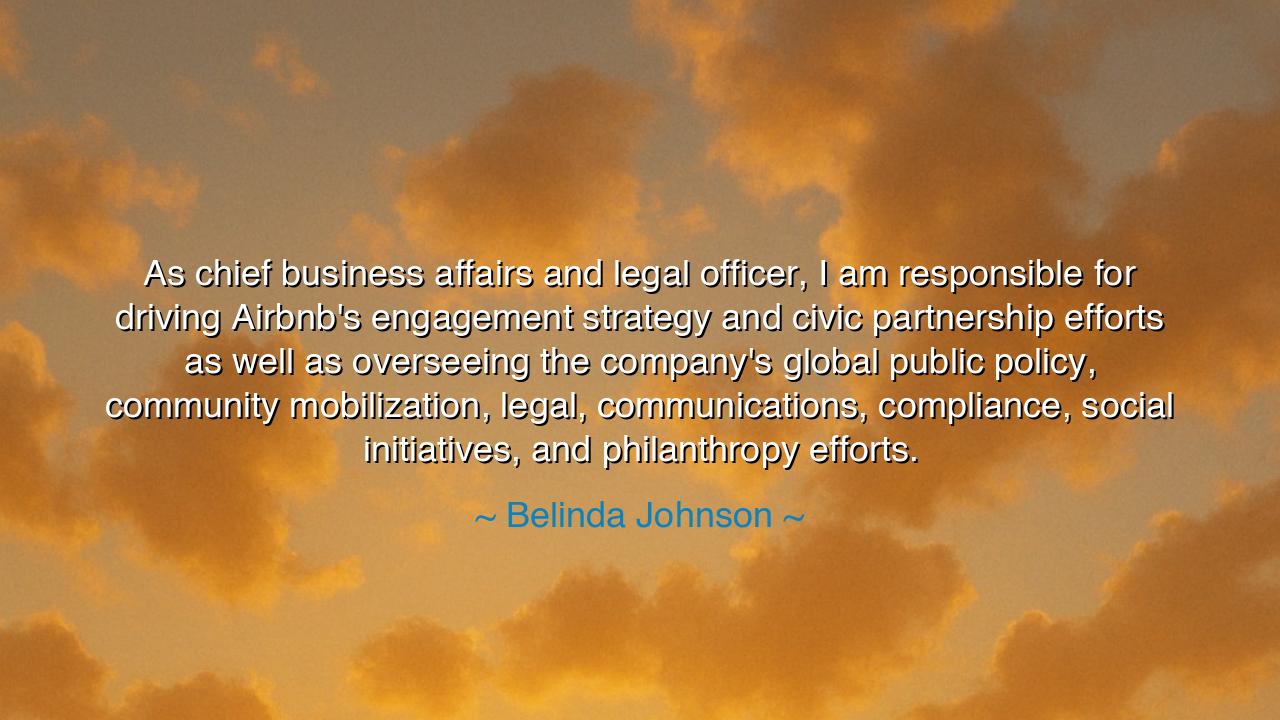
As chief business affairs and legal officer, I am responsible for
As chief business affairs and legal officer, I am responsible for driving Airbnb's engagement strategy and civic partnership efforts as well as overseeing the company's global public policy, community mobilization, legal, communications, compliance, social initiatives, and philanthropy efforts.






“As chief business affairs and legal officer, I am responsible for driving Airbnb's engagement strategy and civic partnership efforts as well as overseeing the company's global public policy, community mobilization, legal, communications, compliance, social initiatives, and philanthropy efforts.” Thus spoke Belinda Johnson, a leader whose words reveal not merely the structure of an office, but the soul of modern stewardship. In these lines, she does not boast of authority—she defines responsibility. She speaks as one who stands at the intersection of law and humanity, of commerce and conscience. Her quote is a reflection of an age when great enterprises are no longer judged by their profits alone, but by their partnership with the world—their harmony with the communities that sustain them.
Belinda Johnson, known for her long and distinguished role at Airbnb, was not simply a guardian of rules but a builder of bridges. In her tenure as chief business affairs and legal officer, she guided the company through the labyrinth of global law, culture, and ethics. Her statement arose during a time when technology firms were transforming how people lived, traveled, and connected—disrupting traditions, but also awakening new responsibilities. When she spoke of engagement strategy and civic partnership, she was invoking a principle that echoes through the ages: that every enterprise, however vast or innovative, must root itself in service to the human good. The ancients called this phronesis—the wisdom of right action, the blending of prudence with moral purpose.
Her words carry a rhythm that speaks of balance. She names the many spheres she oversees—policy, community, legal affairs, communication, compliance, social initiatives, philanthropy—and in doing so, she reveals the complexity of leading in the modern world. It is not the might of command she celebrates, but the unity of disciplines, the weaving together of law and empathy, of structure and vision. The ancients would have recognized in her task the work of the philosopher-king, who must guide the state not merely with laws but with understanding of the people’s heart. For in every company, as in every city, there lies the same truth: power without virtue breeds ruin; but power guided by justice breeds peace.
To understand her quote is to see that leadership, in its truest form, is service elevated to art. Consider the story of Pericles, the great Athenian statesman. He governed not by command alone, but by persuasion, culture, and civic trust. He built the Parthenon not only as a monument to the gods but as a symbol of unity—a declaration that Athens’ greatness lay in its harmony between the citizens and their institutions. So too does Johnson’s description of her role suggest a new form of governance—not of cities, but of global communities bound by technology and shared ideals. She sees that companies like Airbnb, which connect millions across nations, must act not as conquerors of markets but as partners of societies.
In her invocation of “civic partnership efforts,” Johnson reminds us that corporations, like individuals, are part of the moral fabric of civilization. When a company mobilizes its community to act with purpose—to support housing initiatives, respond to crises, or fund philanthropy—it fulfills an ancient duty: to give back to the society that sustains it. The Romans called this officium, the duty owed by the powerful to the common good. Her acknowledgment of these obligations transforms the role of a legal officer into something far greater—a guardian of ethics, a protector of harmony between enterprise and humanity.
Yet her statement also carries a subtle warning. To oversee so many spheres—to command law, policy, communication, and philanthropy—is to walk upon a narrow ridge between influence and integrity. Many have fallen by confusing leadership with dominion, or vision with vanity. But Belinda Johnson’s phrasing—careful, deliberate, grounded in responsibility—shows an awareness of this balance. She knows that law without conscience is tyranny, just as conscience without structure is chaos. Her stewardship, therefore, stands as a testament to moderation, to the art of guiding innovation through the channels of justice and compassion.
The lesson, then, is as timeless as it is urgent: leadership is not possession, but guardianship. Whether in business, government, or community, to lead is to bear the weight of the collective—to see beyond profit into purpose, beyond success into service. Let all who hold power remember that greatness is measured not by the expanse of one’s influence, but by the good one leaves behind. Build bridges, not walls; pursue compliance not for fear, but for fairness; and let every policy be written with the ink of humanity.
So remember the wisdom of Belinda Johnson, seekers of vision and virtue: that in every enterprise, no matter how vast or complex, the heart of leadership beats in the service of others. Let your engagement be authentic, your partnerships sincere, your actions guided by justice and empathy. For when business aligns with the moral order, when innovation serves community and law defends compassion, then does commerce rise to its highest calling—not as an engine of wealth, but as a force of civilization itself.






AAdministratorAdministrator
Welcome, honored guests. Please leave a comment, we will respond soon